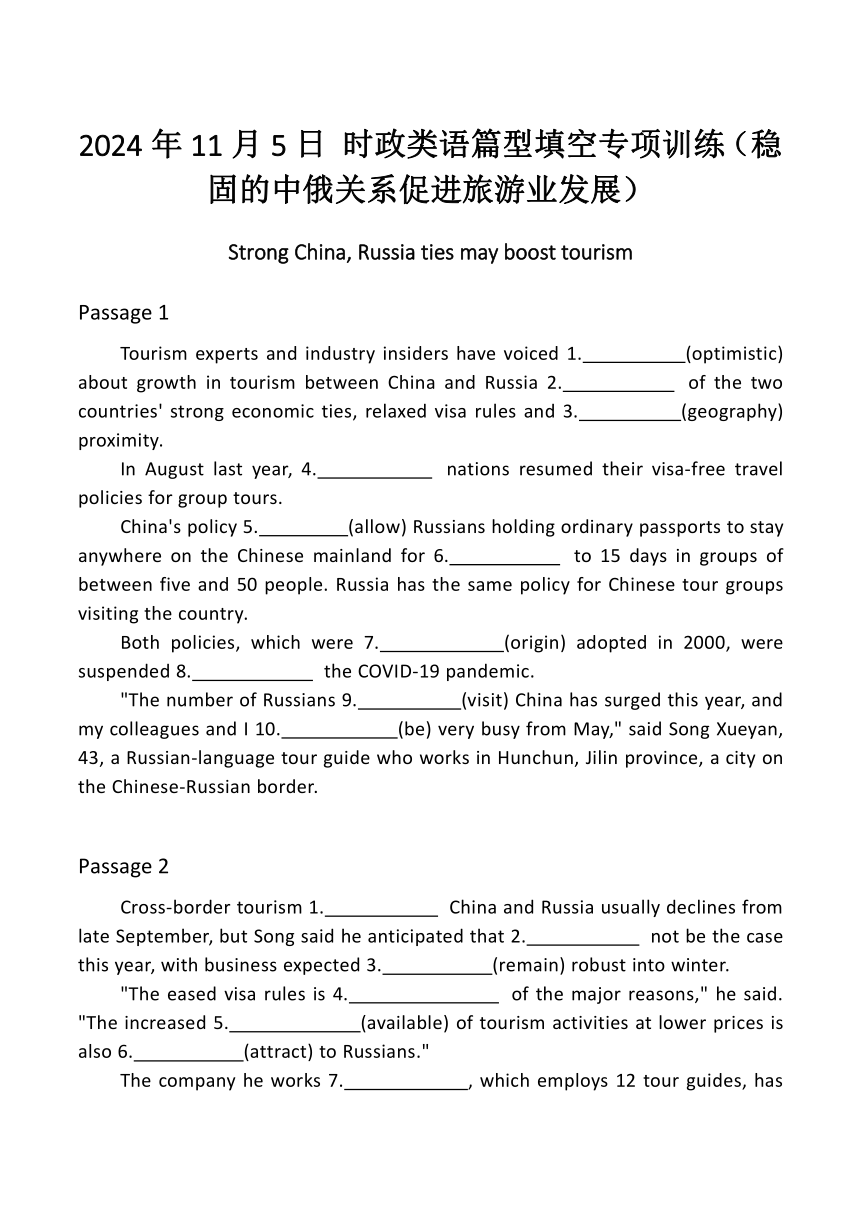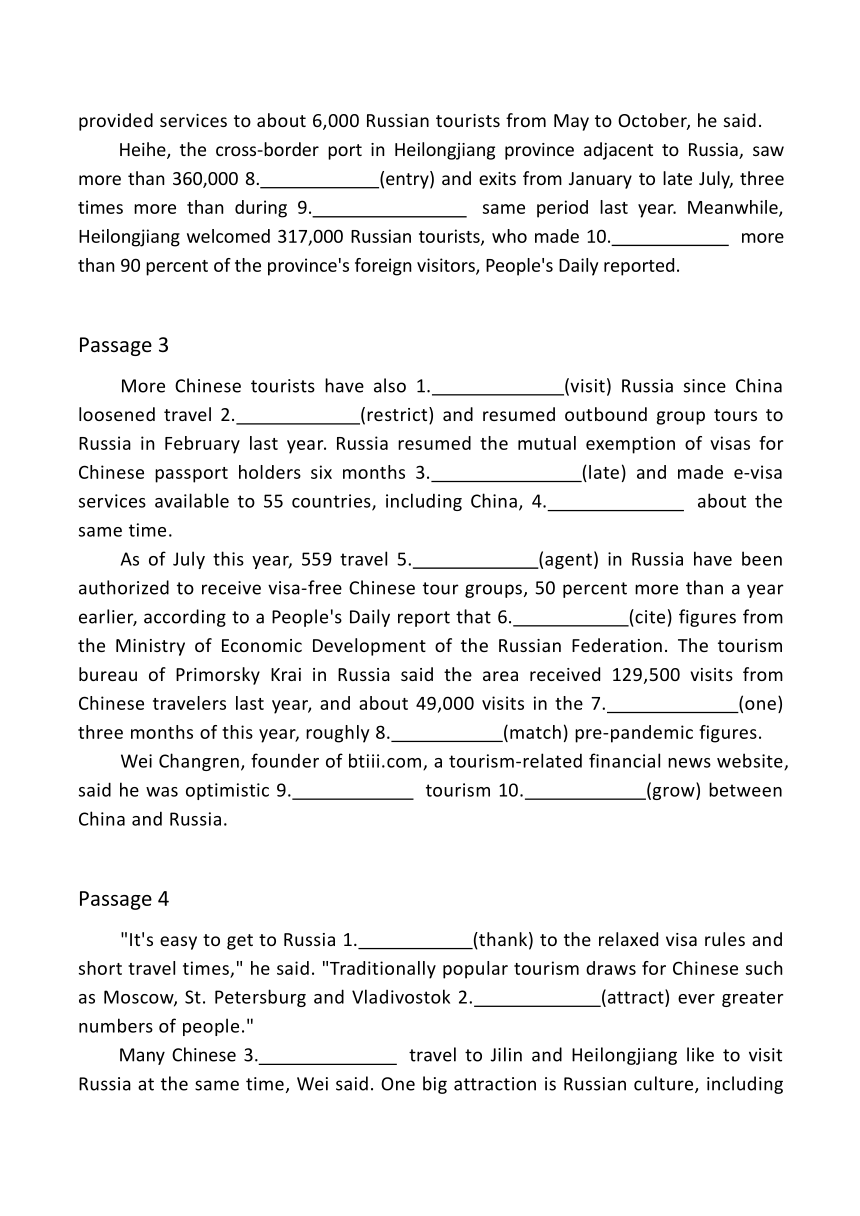2024年11月5日 时政类语篇型填空专项训练(稳固的中俄关系促进旅游业发展)(4篇,含答案与译文)-2025届高三英语复习专项
文档属性
| 名称 | 2024年11月5日 时政类语篇型填空专项训练(稳固的中俄关系促进旅游业发展)(4篇,含答案与译文)-2025届高三英语复习专项 |  | |
| 格式 | docx | ||
| 文件大小 | 27.6KB | ||
| 资源类型 | 教案 | ||
| 版本资源 | 人教版(2019) | ||
| 科目 | 英语 | ||
| 更新时间 | 2025-01-21 10:37:58 | ||
图片预览


文档简介
2024年11月5日 时政类语篇型填空专项训练(稳固的中俄关系促进旅游业发展)
Strong China, Russia ties may boost tourism
Passage 1
Tourism experts and industry insiders have voiced 1. (optimistic) about growth in tourism between China and Russia 2. of the two countries' strong economic ties, relaxed visa rules and 3. (geography) proximity.
In August last year, 4. nations resumed their visa-free travel policies for group tours.
China's policy 5. (allow) Russians holding ordinary passports to stay anywhere on the Chinese mainland for 6. to 15 days in groups of between five and 50 people. Russia has the same policy for Chinese tour groups visiting the country.
Both policies, which were 7. (origin) adopted in 2000, were suspended 8. the COVID-19 pandemic.
"The number of Russians 9. (visit) China has surged this year, and my colleagues and I 10. (be) very busy from May," said Song Xueyan, 43, a Russian-language tour guide who works in Hunchun, Jilin province, a city on the Chinese-Russian border.
Passage 2
Cross-border tourism 1. China and Russia usually declines from late September, but Song said he anticipated that 2. not be the case this year, with business expected 3. (remain) robust into winter.
"The eased visa rules is 4. of the major reasons," he said. "The increased 5. (available) of tourism activities at lower prices is also 6. (attract) to Russians."
The company he works 7. , which employs 12 tour guides, has provided services to about 6,000 Russian tourists from May to October, he said.
Heihe, the cross-border port in Heilongjiang province adjacent to Russia, saw more than 360,000 8. (entry) and exits from January to late July, three times more than during 9. same period last year. Meanwhile, Heilongjiang welcomed 317,000 Russian tourists, who made 10. more than 90 percent of the province's foreign visitors, People's Daily reported.
Passage 3
More Chinese tourists have also 1. (visit) Russia since China loosened travel 2. (restrict) and resumed outbound group tours to Russia in February last year. Russia resumed the mutual exemption of visas for Chinese passport holders six months 3. (late) and made e-visa services available to 55 countries, including China, 4. about the same time.
As of July this year, 559 travel 5. (agent) in Russia have been authorized to receive visa-free Chinese tour groups, 50 percent more than a year earlier, according to a People's Daily report that 6. (cite) figures from the Ministry of Economic Development of the Russian Federation. The tourism bureau of Primorsky Krai in Russia said the area received 129,500 visits from Chinese travelers last year, and about 49,000 visits in the 7. (one) three months of this year, roughly 8. (match) pre-pandemic figures.
Wei Changren, founder of , a tourism-related financial news website, said he was optimistic 9. tourism 10. (grow) between China and Russia.
Passage 4
"It's easy to get to Russia 1. (thank) to the relaxed visa rules and short travel times," he said. "Traditionally popular tourism draws for Chinese such as Moscow, St. Petersburg and Vladivostok 2. (attract) ever greater numbers of people."
Many Chinese 3. travel to Jilin and Heilongjiang like to visit Russia at the same time, Wei said. One big attraction is Russian culture, including the 4. (architect), which contrasts with that of China's, he said. "China and Russia have a longstanding 5. (friend) that includes economics and people-to-people exchanges, and deepening ties will continue 6. (drive) tourism collaboration."
In March, Chi Zijian, a member of the Chinese People's Political Consultative Conference National Committee, proposed 7. China-Russia cultural and tourism belt in Heilongjiang.
The province can gain 8. (finance) support from the central government 9. (improve) infrastructure such as roads and railways, she said, and a China-Russia cultural and tourism belt 10. (connect) the province's 18 border counties and districts and 19 ports would offer quicker and easier access for Russians to China.
参考答案
参考答案1
1.optimism 2.because 3.geographical 4.both 5.allows
6.up 7.originally 8.during 9.visiting 10.were
参考译文1
旅游专家和业内人士对中俄两国旅游业的增长表示乐观,因为两国经济联系紧密,签证规定宽松,地理位置接近。
去年8月,两国恢复了团体旅游免签证政策。
中国的政策允许持有普通护照的俄罗斯人以5至50人为一组,在中国大陆任何地方停留最多15天。俄罗斯对中国旅游团也有同样的政策。
这两项政策最初于2000年实施,但在2019冠状病毒病大流行期间暂停实施。
43岁的宋雪岩(音)是一名俄语导游,在中俄边境城市吉林省珲春市工作。他说:“今年来中国旅游的俄罗斯人激增,从5月开始,我和我的同事就很忙。”
参考答案2
1.between 2.will 3.to remain 4.one 5.availability
6.attractive 7.for 8.entries 9.the 10.up
参考译文2
中国和俄罗斯之间的跨境旅游通常从9月下旬开始下降,但宋表示,他预计今年不会出现这种情况,预计业务将在冬季保持强劲。
“放宽签证规定是主要原因之一,”他说。“以更低的价格提供更多的旅游活动对俄罗斯人也很有吸引力。”
他说,他所在的公司雇佣了12名导游,从5月到10月为大约6000名俄罗斯游客提供了服务。
从1月到7月下旬,黑龙江省与俄罗斯接壤的跨境口岸黑河的出入境人数超过36万,是去年同期的三倍多。与此同时,据《人民日报》报道,黑龙江接待了31.7万名俄罗斯游客,占该省外国游客的90%以上。
参考答案3
1.been visiting 2.restrictions 3.later 4.at 5.agencies
6.cited 7.first 8.matching 9.about 10.growth
参考译文3
自去年2月中国放松旅游限制并恢复俄罗斯出境旅行团以来,越来越多的中国游客前往俄罗斯。六个月后,俄罗斯恢复了对中国护照持有人的互免签证,并在大约同一时间向包括中国在内的55个国家提供电子签证服务。
据《人民日报》援引俄罗斯联邦经济发展部的数据报道,截至今年7月,俄罗斯已有559家旅行社获准接待免签证的中国旅行团,比一年前增加了50%。
俄罗斯滨海边疆区旅游局表示,该地区去年接待了12.95万名中国游客,今年前三个月接待了约4.9万人次,与疫情前的数字大致相当。
旅游相关财经新闻网站的创始人魏长仁表示,他对中俄旅游业的增长持乐观态度。
参考答案4
1.thanks 2.are attracting 3.who 4.architecture 5.friendship
6.to drive 7.a 8.financial 9.to improve 10.connecting
参考译文4
“由于宽松的签证规定和较短的旅行时间,去俄罗斯很容易,”他说。“莫斯科、圣彼得堡和符拉迪沃斯托克等传统上受中国人欢迎的旅游景点正在吸引越来越多的游客。”
魏说,许多去吉林和黑龙江旅游的中国人喜欢同时去俄罗斯。他说,一个很大的吸引力是俄罗斯文化,包括建筑,这与中国的文化形成了对比。
“中国和俄罗斯有着悠久的友谊,包括经济和人文交流,深化关系将继续推动旅游合作。”
今年3月,全国政协委员迟子建提出在黑龙江建设中俄文化旅游带。
她说,该省可以从中央政府获得财政支持,以改善公路和铁路等基础设施,一条连接该省18个边境县和地区以及19个港口的中俄文化和旅游带将为俄罗斯人进入中国提供更快、更方便的途径。
Strong China, Russia ties may boost tourism
Passage 1
Tourism experts and industry insiders have voiced 1. (optimistic) about growth in tourism between China and Russia 2. of the two countries' strong economic ties, relaxed visa rules and 3. (geography) proximity.
In August last year, 4. nations resumed their visa-free travel policies for group tours.
China's policy 5. (allow) Russians holding ordinary passports to stay anywhere on the Chinese mainland for 6. to 15 days in groups of between five and 50 people. Russia has the same policy for Chinese tour groups visiting the country.
Both policies, which were 7. (origin) adopted in 2000, were suspended 8. the COVID-19 pandemic.
"The number of Russians 9. (visit) China has surged this year, and my colleagues and I 10. (be) very busy from May," said Song Xueyan, 43, a Russian-language tour guide who works in Hunchun, Jilin province, a city on the Chinese-Russian border.
Passage 2
Cross-border tourism 1. China and Russia usually declines from late September, but Song said he anticipated that 2. not be the case this year, with business expected 3. (remain) robust into winter.
"The eased visa rules is 4. of the major reasons," he said. "The increased 5. (available) of tourism activities at lower prices is also 6. (attract) to Russians."
The company he works 7. , which employs 12 tour guides, has provided services to about 6,000 Russian tourists from May to October, he said.
Heihe, the cross-border port in Heilongjiang province adjacent to Russia, saw more than 360,000 8. (entry) and exits from January to late July, three times more than during 9. same period last year. Meanwhile, Heilongjiang welcomed 317,000 Russian tourists, who made 10. more than 90 percent of the province's foreign visitors, People's Daily reported.
Passage 3
More Chinese tourists have also 1. (visit) Russia since China loosened travel 2. (restrict) and resumed outbound group tours to Russia in February last year. Russia resumed the mutual exemption of visas for Chinese passport holders six months 3. (late) and made e-visa services available to 55 countries, including China, 4. about the same time.
As of July this year, 559 travel 5. (agent) in Russia have been authorized to receive visa-free Chinese tour groups, 50 percent more than a year earlier, according to a People's Daily report that 6. (cite) figures from the Ministry of Economic Development of the Russian Federation. The tourism bureau of Primorsky Krai in Russia said the area received 129,500 visits from Chinese travelers last year, and about 49,000 visits in the 7. (one) three months of this year, roughly 8. (match) pre-pandemic figures.
Wei Changren, founder of , a tourism-related financial news website, said he was optimistic 9. tourism 10. (grow) between China and Russia.
Passage 4
"It's easy to get to Russia 1. (thank) to the relaxed visa rules and short travel times," he said. "Traditionally popular tourism draws for Chinese such as Moscow, St. Petersburg and Vladivostok 2. (attract) ever greater numbers of people."
Many Chinese 3. travel to Jilin and Heilongjiang like to visit Russia at the same time, Wei said. One big attraction is Russian culture, including the 4. (architect), which contrasts with that of China's, he said. "China and Russia have a longstanding 5. (friend) that includes economics and people-to-people exchanges, and deepening ties will continue 6. (drive) tourism collaboration."
In March, Chi Zijian, a member of the Chinese People's Political Consultative Conference National Committee, proposed 7. China-Russia cultural and tourism belt in Heilongjiang.
The province can gain 8. (finance) support from the central government 9. (improve) infrastructure such as roads and railways, she said, and a China-Russia cultural and tourism belt 10. (connect) the province's 18 border counties and districts and 19 ports would offer quicker and easier access for Russians to China.
参考答案
参考答案1
1.optimism 2.because 3.geographical 4.both 5.allows
6.up 7.originally 8.during 9.visiting 10.were
参考译文1
旅游专家和业内人士对中俄两国旅游业的增长表示乐观,因为两国经济联系紧密,签证规定宽松,地理位置接近。
去年8月,两国恢复了团体旅游免签证政策。
中国的政策允许持有普通护照的俄罗斯人以5至50人为一组,在中国大陆任何地方停留最多15天。俄罗斯对中国旅游团也有同样的政策。
这两项政策最初于2000年实施,但在2019冠状病毒病大流行期间暂停实施。
43岁的宋雪岩(音)是一名俄语导游,在中俄边境城市吉林省珲春市工作。他说:“今年来中国旅游的俄罗斯人激增,从5月开始,我和我的同事就很忙。”
参考答案2
1.between 2.will 3.to remain 4.one 5.availability
6.attractive 7.for 8.entries 9.the 10.up
参考译文2
中国和俄罗斯之间的跨境旅游通常从9月下旬开始下降,但宋表示,他预计今年不会出现这种情况,预计业务将在冬季保持强劲。
“放宽签证规定是主要原因之一,”他说。“以更低的价格提供更多的旅游活动对俄罗斯人也很有吸引力。”
他说,他所在的公司雇佣了12名导游,从5月到10月为大约6000名俄罗斯游客提供了服务。
从1月到7月下旬,黑龙江省与俄罗斯接壤的跨境口岸黑河的出入境人数超过36万,是去年同期的三倍多。与此同时,据《人民日报》报道,黑龙江接待了31.7万名俄罗斯游客,占该省外国游客的90%以上。
参考答案3
1.been visiting 2.restrictions 3.later 4.at 5.agencies
6.cited 7.first 8.matching 9.about 10.growth
参考译文3
自去年2月中国放松旅游限制并恢复俄罗斯出境旅行团以来,越来越多的中国游客前往俄罗斯。六个月后,俄罗斯恢复了对中国护照持有人的互免签证,并在大约同一时间向包括中国在内的55个国家提供电子签证服务。
据《人民日报》援引俄罗斯联邦经济发展部的数据报道,截至今年7月,俄罗斯已有559家旅行社获准接待免签证的中国旅行团,比一年前增加了50%。
俄罗斯滨海边疆区旅游局表示,该地区去年接待了12.95万名中国游客,今年前三个月接待了约4.9万人次,与疫情前的数字大致相当。
旅游相关财经新闻网站的创始人魏长仁表示,他对中俄旅游业的增长持乐观态度。
参考答案4
1.thanks 2.are attracting 3.who 4.architecture 5.friendship
6.to drive 7.a 8.financial 9.to improve 10.connecting
参考译文4
“由于宽松的签证规定和较短的旅行时间,去俄罗斯很容易,”他说。“莫斯科、圣彼得堡和符拉迪沃斯托克等传统上受中国人欢迎的旅游景点正在吸引越来越多的游客。”
魏说,许多去吉林和黑龙江旅游的中国人喜欢同时去俄罗斯。他说,一个很大的吸引力是俄罗斯文化,包括建筑,这与中国的文化形成了对比。
“中国和俄罗斯有着悠久的友谊,包括经济和人文交流,深化关系将继续推动旅游合作。”
今年3月,全国政协委员迟子建提出在黑龙江建设中俄文化旅游带。
她说,该省可以从中央政府获得财政支持,以改善公路和铁路等基础设施,一条连接该省18个边境县和地区以及19个港口的中俄文化和旅游带将为俄罗斯人进入中国提供更快、更方便的途径。
